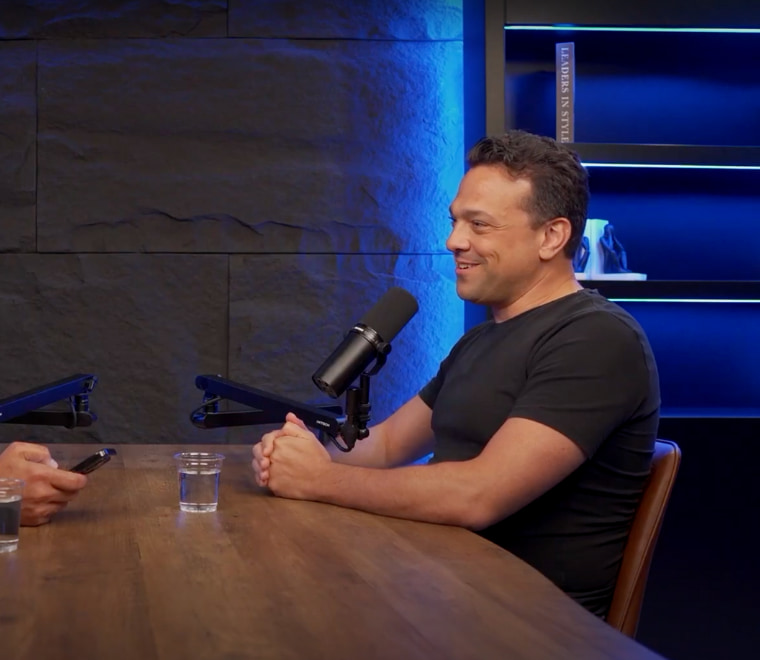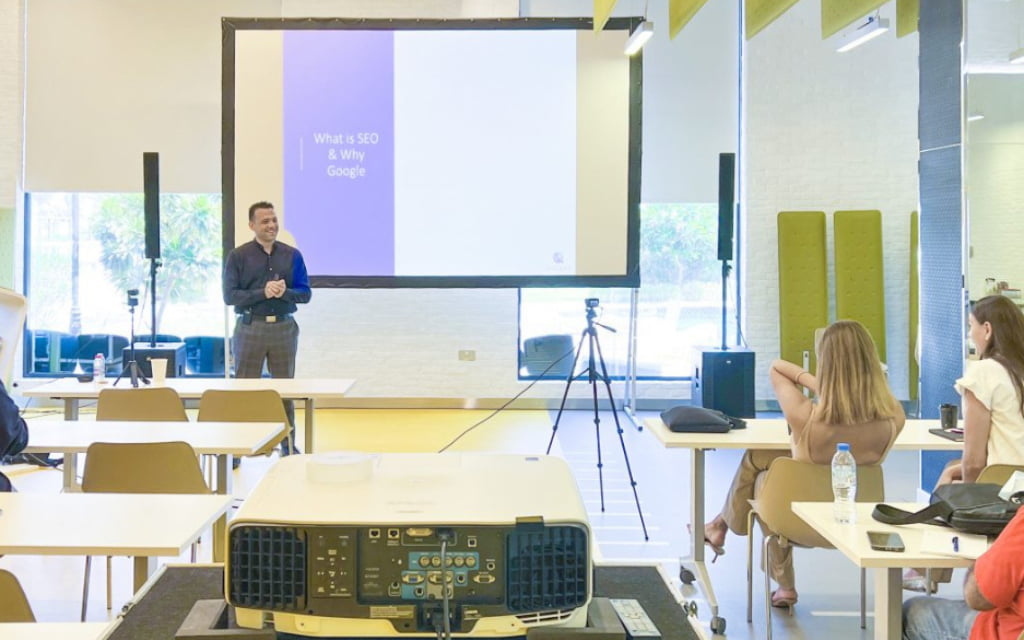The Fusing the Unfusable has hosted the industry expert Mazen Aloul, CEO of WebQuest SEO to dive deep into the future of SEO, AI-generated content, and organic search growth. Watch the video below:
Video Transcript:
Karim Sahyoun
Welcome to fusing the unfusable. Tonight’s guest Mazin Aloul. Thank you for coming. Mazen. Mazen is the founder and CEO of WebQuest DMCC, a digital agency based in Dubai that really specializes in search engine optimization or SEO in both English and Arabic. He’s worked with hundreds of websites over the last 10 years, including some of the largest across the MENA region. Prior to this, Mazen was a partner at a communications agency, a regional manager for software development company and a technical instructor. Mazen also does work with the Ministry of Education the UAE to teach programming to high school students forming the UAE national youth programming team that participated in the International programming Olympics. Amazing,
Mazen Aloul:
Yeah, some time ago, but yes.
Karim Sahyoun
Amazing. Amazing. Mazin, welcome to the show.
Mazen Aloul
Thanks.
Karim Sahyoun
Thanks for joining us and teaching us about SEO.
Mazen Aloul
I’d love to
Karim Sahyoun
We hear it so much, but it’s it’s involved, right? SEO is basically organic search, right?
Mazen Aloul
Yes, it’s everything below the ads when you run a search on Google,
Karim Sahyoun
Amazing. So marketing, business for businesses, you know, businesses doing marketing, especially new businesses. It’s changed tremendously over the last two decades. Yeah, the Advent adoption of the web and then the smart the whole mobile phone thing, you know, has changed and improved our lives tremendously. We don’t, sometimes we don’t realize how much your work is really, really focused on this and dedicated to this organic search growth right? Walk us through this domain and how you help businesses since many, many years now, improve their bottom lines.
Mazen Aloul
All right. So there’s a lot happening, and has been happening in this space. It moves very quickly. It adjusts the technology very quickly. So as you mentioned, when we first started, or when I first started 10 years ago. It was pretty easy to or it was easier to spam the system try and use tactics just to gain that extra foot on the Google rankings. It’s not as easy anymore, so there’s a constant battle between those who are trying to take shortcuts, and I’d say mainly Google, because it’s the dominant engine on the internet and for most of the world, so that there’s a race and a competition between those who are trying to cheat the system and how Google reacts. But over the last two to three years, Google has employed more and more technologies to counter the spam tactics that were at the time are still trying to be developed.
Karim Sahyoun
When you say when you say spam tactics, you mean they’re looking for quality content, rather than just have,
Mazen Aloul
Absolutely yes, yes. So they’re shifting to focus more on things that would help the end user, and not websites or content or elements of websites that are made for machines. So that has been the line, but with focusing on what’s useful for the end user, you adjust and you steer websites to implement mobile first technologies, to implement faster websites, to implement adjustable website etc, that help implement the best technologies for the end user, and less focus on technical stuff that.
Karim Sahyoun
So by default, by doing that, by improving the quality the way your website looks, Google will then rank you higher.
Mazen Aloul
It’s one of many, many factors. But yes, so primarily improving the quality of the content, showing that it’s written by real people with real experience that this is recent. In the last few years prior to this, you could post something without saying who wrote it, right? It’s a ghost writer. Or you could copy and adjust and edit from different places. But now Google’s at a point where it knows if you copied something from somewhere else, and even if you make some edits, it will know that this is not new. This is not useful. This has been it saw it before, so it won’t give you the advantage of ranking high for that.
Karim Sahyoun
that’s so interesting. That’s really interesting.
So, you know, here we are. We’re talking about writing and humans writing, and we jump to the topic of AI, right? Yes, AI and open aI have really changed the way we search online. A lot of us are using chatgpt for search and for intelligent responses, right? Not just and Google’s done that as well. We see that, right? You see, I don’t know what you call that, but the top, sometimes when you ask a question, it does try to give you an answer. But this, how has this affected your work in organic search? Is there, is there an opportunity to tweak the approach, or do we just keep I mean. You, of you just said that you are continuously tweaking right to ensure that you know the algorithms Google’s algorithms are, are adjusting so you you need to to kind of follow that. But how has that shift? I mean, this is relatively new. We’re talking the last few months. You know, a lot of adoption.
Mazen Aloul
There’s a lot to unpack here. So as a starting point, Google has been using AI for quite a few years in its internal systems. I think what caught them off guard is the unleash of chatgpt and the interface that they came with with that technology. What was that end of 2022, right? November, December, 2022 and with that, it’s been a race. Actually, the T in chatgpt stands for its transformers, and it’s a technology developed initially by Google, and it put out the papers out there on how it works, and that’s how OpenAI adjusted and built a whole system based, actually, on Google technology. But yeah, back to to the space. So what we’re seeing is many things change, especially when it comes around content creation. I mean, I think primarily where we’re seeing a lot of impact is the the ease of creating content at the moment. So as soon as chat GPT was released, you saw all these guides and videos of experts on the internet that went out and said, Now you can create articles and blog posts with prompts, etc. Because prior to chat GPT, it was easy to detect whether the the content was written by a machine or by a person with the release of GPT three, 3.5 and now four. It’s almost impossible to tell the difference between human written and AI generated written and interestingly, right around the same time, or six months after chatgpt was released, Google adjusted their guidelines so their guidelines specifically said that content has to be human generated. Can’t be machine generated. They adjusted the wording to say, content has to be useful, right? Because the way the the large language model technology, or these chatgpt, Gemini, perplexity, whatever is based on going through existing knowledge, so they’ll give you something that already exists. They won’t give you something new. They don’t have the creativity, etc. And the models are trained, trained on snapshots of the internet, so they’re not always up to date with the latest information out there. So with that in mind, when you prompt chat GPT for an article, it’s going to give you something that already exists, and that’s something that Google systems already have seen and know. So therefore, the usefulness and the guidelines, if you’re giving the internet or you’re publishing something that already exists, you’re not coming up with anything useful, like it’s nothing new. So why should we rank you versus somebody who already had published that? So I think this is still something that not a lot of people have caught up to. We still see websites are crunching out 10s of articles a week, and it’s not working. It can work for the short term, but sooner or later, the whole site, the traffic crashes, etc. So the interesting part here is back to your question, is that angle of adjustment within the whole SEO process, because content is one pillar out of several, and that’s where we’re seeing like an influx of of content, content on the internet, which most of it is just repetitive of things that existed. So that’s on the on the execution side, but when you come to look at the user behavior side, it’s a different story. What we’re seeing, it’s still very, very early, but what we’re seeing is people are heading to these language models for information based searches, how to cook something, or how to do this, how to do that, asking for information about a certain topic, these models are very good at giving you decent answers. But if you dig deep into a topic, regardless of the topic, whether it’s medical or technical or sciences or et cetera, it starts to be repetitive, it loses track. It might hallucinate. We’ve heard that a lot, so still, it’s still not there. I don’t know if it ever will be there in terms of a technology, but we’ll have to wait and see. So yeah, it’s an interesting space.
Karim Sahyoun
I’ll share an anecdote with you on this. I love fixing my cars, and you know, one of the things that is are difficult to read are user manuals in repair manuals. And I thought, let me try. And I asked chat GPT, how to fix the fuse, or how to fix the fuse, find the fuse in the car, for the rear shade of my car. And it was able to, you know, to guide me right to it just by having access these repair manuals for a certain model. So it’s prompt prompting. You still have to ask the right question in the right way. But yeah, that’s that’s really interesting, and and tying it back to why? Why are we talking about SEO in the end, ranking is what gets traffic right? Yes, so we’re stating a bit to the obvious. But if you want to have traffic, you want to be ranked in the top by Google in order to get some some decent traffic, which is the objective, right? And I think if I was to summarize what you just said, it’s basically still quality over quantity, right? Focus on quality content. Yes, it’s nice to have a lot of blogs and articles, but if they’re not quality, even the machine will detect that if people actually read them, they’ll come to the same conclusion, right?
Mazen Aloul
Absolutely. And there is more focus now on other aspects that can prove that you are a real business with real people behind it, versus just the quality, sorry, the content for content sake. So there is, there are a number of new signals that Google has introduced around experience, authority, trust, where, for example, when you publish something, it’s highly recommended you put a name behind it. You have a profile that’s linked to your social media profiles. So you’re sending all these signals saying, I’m a real person. Here is my social media activity. I exist here. This is where I studied. This is my experience. These are the conferences I attended, etc, versus just blurt out content which was written by the writer at Company X, right? So that’s where the focus is slightly shifted as well.
Karim Sahyoun
That’s interesting. So when you’re creating content, put your socials, put your LinkedIn, where you have, you should have an up to date profile, which shows that you’re educated, that you’re in in this field. Link your link your other socials, where it could the machine is able to cross reference with your Twitter to see that you’re actually talking about this and you’re a reliable source, credible. Yes, that’s really interesting. I love trust. Obviously, in web three, we care a lot about trust and transparency. But this is, this is really interesting. I haven’t, never, didn’t think of that, that Google’s doing that. And obviously, as these language models get better, Google is also going to get better, right? Yes, and I don’t know much about their, their, you know, their AI language models, but I know that they’re, obviously now rushing to improve and catch up.
Mazen Aloul
Yeah, they lost that race. They had the technology. They weren’t. They kept it internally, and now they’re just trying to play catch up with chat GPT. But being the first entrant, I think chat GPT still has the largest market share in that space.
Karim Sahyoun
That’s incredible. That’s incredible what chatgpt has done. So we’ve probably answered this question, but let me ask it again. What are some of the things small businesses and startups still not doing right to improve their online footprints?
Mazen Aloul
Have a website where you can show as real information as possible. So that includes, for example, pictures of your team members, right? Not stock images, pictures of your actual team members, of your offices, of conferences you’ve attended, maybe an activity within the team in terms of content, something that, again, is that reflects your experiences. Definitely in the About Us section, talk about how the company was founded, the people behind it identify the individuals, half profile pages for the members of the team where you show you know. This is Kareem. He studied here. This is his experience. He worked at this place, and that place. Here is his LinkedIn. So all this now matters, versus having a profile which fill of Shutterstock images and content generated by chatgpt, that won’t get you too far. So yes.
Karim Sahyoun
That’s interesting. That’s really interesting, and I think, very useful for so let’s, let’s jump to another one of my favorites, and one of my favorite people, Gary V you know, he once said, and I quote, find Malibu real estate before it becomes Malibu real estate, when he was referring to voice search. And my understanding is that voice search can be improved via SEO. So you know what? What do you know how? How do businesses change the way they market themselves in order to ensure that they are improving the voice search, Siri, Siri is about to get a huge upgrade, depending on when this podcast is released. But it looks like it’s not too far.
Mazen Aloul
Okay, okay. I remember a few years ago, sure, six, seven years ago, when there was a lot of talk about voice search and voice searches coming, and that’s going to eat up a lot of the searches we see from, you know, your typical search in. Text et cetera. Honestly, we didn’t see much. I think it’s a layer that comes in terms of entering the query, as opposed to using devices like Siri et cetera, because the underlying fundamentals still remain the same. And in terms of looking at traffic sources to almost all the websites I’ve worked with over the 10 last 10 years, we saw very, very little traffic coming in from different all these different machines, most of it is from search engines or devices. So it wasn’t the big shift that everybody thought it would be, or most people thought it would be. However, the advice was, when it comes to, for example, your important pages, your service pages, your E commerce landing category pages, etc, have a section about FAQs, frequently asked questions. So give a give a question, a simple question, a common question, and a very simple, short answer, no need to, you know, over stuff. It with things left and right. And that helps, because those are the ones that are easy to pick up, and probably what people are asking, or a variant around that that people are asking. And that’s how you get visibility there.
Karim Sahyoun
Yeah, FAQs, I remember are really important and under, underestimated, right? Underrated, underrated. That’s really interesting. I think what’s happening with Voice Search is that, and you know, often they don’t understand, right, our queries. So unless you keep your query very simple to Siri or to Alexa, you’re, you’re going to get a, you’re going to get a. They might misunderstand it, right, especially with spelling, names and things. But what’s happened with chat GPT, and I have it on my phone, is that it’s much better, absolutely, right? So I’m having conversations with chat GPT in the car, right? Yes, and, and building up, you know, results that I might once I finish driving, can catch up, catch up and read on. And so I think there’s going to be a change. I think Siri is getting a major upgrade. There’s some debate about how Apple’s going to do that. Are they going to use open AI or their data is not going to leave apple? There’s some discussions ongoing right now, but it feels like Siri is going to get an upgrade, because if chatgpt can do it, why can’t Apple do it, or Google? So it’s going to be interesting to see, interesting times, definitely. So you know what? What do you see as the biggest opportunity in the coming two years for businesses that are that are really switched on? And what’s the secret sauce you’ve mentioned? You’ve given us a lot of tips. Thank you. I’m sure our listeners will will benefit from that, especially the FAQs, the fact that focus on quality, the about us, you’ve given amazing, amazing advice. But what you know, what’s coming, what’s what’s what’s coming, what’s coming.
Mazen Aloul
It like things are moving really quickly. So your window now is three to six months down the line. A year down the line is, is very far off within the space, right? There’s a lot that can come in. What we’re seeing is obviously the the more reliance on AI and different things. So now we’re seeing it in image generation, in video creation, again, prompting to create videos, prompting to create images. So everything around content creation, sorry, I think we’ll see more integration with different systems where AI can help the integration and drive automation and workflow management between different parts of the organization. So yeah, it will help make existing existing teams much more productive. We use it a lot. For example, for junior level employees, it’s very easy for them to learn quickly because, again, it has a lot of these answers to the basics. But once you’re asking more detailed intermediate stuff, it can give you things that are little bit off or incorrect. And when you come when it comes to really deep knowledge, it’s usually it doesn’t know, doesn’t say it doesn’t know can be wrong. So just be a little bit careful there. But yes, in terms of learning curves, internal in terms of information available for teams, Fast Track research, get ideas. Yeah, that’s where we see things shifting really quickly.
Karim Sahyoun
I think that’s really valuable advice. You know, in the content basically, the advice is that for content creation, do use AI, but be careful. Verify it, but use it more for creativity, for brainstorming, for finding ideas, but then still focus on the quality and make sure that you know the text is vetted and you’re not spewing stuff that will make you look silly and eventually hurt your hurt your business.
Mazen Aloul
I. Absolutely yes, yeah, just make sure you read whatever that.
Karim Sahyoun
I have a question that’s not really related to SEO, and I don’t know if you’re so the image generation capabilities, I’ve been playing around with it, but I find that whenever I create an image, it misspells things in the image.
Mazen Aloul
Yeah, because it’s drawing it, it’s, it’s, it’s trying to draw the letters again based on semantics. So, yeah, I saw the same thing. If you tell it to put some words on the images, most of the time there’s misspelling. It might get it right, but that’s I found that to be the minority of cases. So in the vast majority of issues, there is misspellings, misalignments, even if you try in Arabic, it’s even funnier than in English.
Karim Sahyoun
I haven’t tried in Arabic. I’m sure it’s I’m sure it’s even harder, right? Because the the language models have less to work with, or,
Mazen Aloul
Yes, probably less data out there. Yes, absolutely. Like, if you think of the amount of content being generated and put out in English versus Arabic or any other language. English, by far, is the most dominant. But yeah, I can reference here a study I did, I’ll say five or six years ago about Arabic content, right? So if I remember correctly, there are 300 to 400 million Arab speakers, which is five to 6% of the world population, maybe 7% of the world population. But when you come to look at content on the internet, the amount of content at the time, the amount of Arabic content, in terms of overall percentage, was less than 1% so when you have the world population, Arab world populations is six, 7% 8% but the content on the internet is less than 1% you have a big, big gap. I think it’s a little bit better now, but this goes to show that that there is a lot to gain in terms of building an online presence in Arabic with quality content, because that 1% includes, or that less than 1% includes a lot of forums and really low quality content. Not only like decent websites, but yes, it’s lacking a lot. It’s quite an open space.
Karim Sahyoun
Which brings me to the final question. You know, we obviously work with various startups and website goes up in English. How much value is there to create proper Arabic content?
Mazen Aloul
It’s growing. Value really depends on your market, your target audience. So for example, if you look at online presence in Saudi, it’s primarily in Arabic, like the youth, their presence, their profiles, their searches, everything’s in Arabic. I would say the same in Iraq, in Egypt, in Algeria. So these countries with large or big populations, especially big young populations, their first exposure to online, and their interaction online is primarily in Arabic, so there’s a lot of opportunity there, and everything that they’re interested in, right? So we’re seeing a lot of interest around sports, news, some e commerce, more and more, anything around fashion, football clubs, TV series, so there’s massive interest there in more now medical like end user medical information and websites. But still, I think on the business to business side, it’s it’s still not there. So I think people are executives, higher medium, upper management, they still tend to search. If they’re looking for something, they’ll tend to do it in English more than Arabic. So B to B, not as much, but it’s there. It’s growing. But I still think the English side is still a little bit stronger. But when it comes to B to C, and things that are for for youth, people in their 20s and 30s, it’s yeah, the opportunity is there. There the competition is much less than it is in English in terms of online presence and SEO.
Karim Sahyoun
That’s amazing. Thank you so much for all these tips. I mean, they’re very valuable, I look forward to having you again.
Mazen Aloul
Anytime. Thanks, Karim, it’s been a pleasure.




